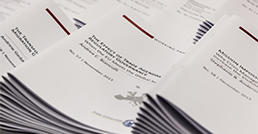New Working Papers Published
Jul 04, 2016
Working Papers
Image Credit: Business Fotografie Inga Haar www.business-fotografie.de/
Last month, two Working Papers were published: WP No. 72 by Stephen Clarkson with the contribution by his students and WP No. 73 by Frank Schimmelfennig.
Working Paper No. 72 „The Contradictions and Compatibilities of Regional Overlap: The Dynamics of Mexico’s Complementary Membership in NAFTA and the Pacific Alliance”
Stephen Clarkson with Jeff Cui, Isabel Duchesne, John Pan, Beom-Jun Park, Alissa Saieva, and Amy TieuWhen a state joins two regional organizations (ROs) pursuing such different objectives in the same region as integration and security, international relations scholarship focuses on whether the obligations defined by the one organization are compatible with those laid down in the other. On the other hand, when a state belongs to two ROs with the same policy scope but in different regions, the possibility that this “regional overlap” creates conflicts between differing normative and institutional commitments that can generate contradictions rather than complementarities for the government involved is considerably more challenging for analysts. These dilemmas were raised in 2012 by Mexico when, already a member of the North American Free Trade Agreement since 1994, it founded the Pacific Alliance with three far-off countries, Chile, Colombia, and Peru. This paper tackles four puzzles that the resulting regional overlap presented: Why, when its trade was overwhelmingly directed at the North American market, did Mexico join the Pacific Alliance offering poor prospects for increasing its foreign commerce? How, as a third world rule-taker on trade issues, did it become a first world rule-maker which urged the new Alliance to adopt NAFTA’s foreign direct investment protection norms and institutions? In border security matters, was Mexico finding allies who could help the country resist overbearing US demands for collaboration in its “wars” on drugs and terrorism or was it diffusing Washington’s norms southwards to its fellow member states in the Andes? Were the geopolitical implications of Mexico’s regional overlap to reaffirm its credentials in Latin America or to support the United States’ efforts to offset the consolidation there of China’s trade, investment, and security presence? Our discussion of these four puzzles will reveal a surprising set of complementarities rather than contradictions between Mexico’s policy obligations, actions, and prospects in these two distinct ROs.
Click here to view this working paper.
Working Paper No. 73 „Graded Membership in the European Union: Good Governance and Differentiated Integration”
Frank SchimmelfennigThe study of European integration has traditionally focused on organizational growth: the deepening and widening of the European Union (EU). By contrast, this article analyzes organizational differentiation, a process in which states refuse, or are being refused, full integration but find value in establishing in-between grades of membership. It describes how the EU’s system of graded membership has developed, and it explains the positioning of states in this system. The core countries of the EU set a standard of good governance. The closer European countries are to this standard, the closer their membership grade is to the core. Some countries fall short of this standard and are refused further integration by the core: their membership grade increases with better governance. Other countries refuse further integration because they outperform the standards of the core countries: their membership grade decreases as governance improves. These conjectures are corroborated in a panel analysis of European countries.
Announcement
Coming up next in the KFG-working paper series: Tanja A. Börzel "From EU Governance of Crisis to Crisis of EU Governance: Regulatory Failure, Redistributive Conflict, and Eurosceptic Publics".
